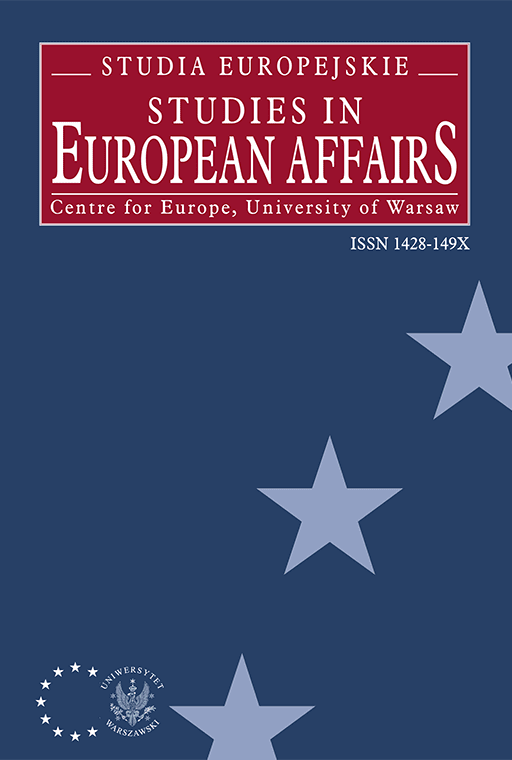
ISSUE: 2/2009
- Volume 50
- Number 2
- 2009
Subscribe NEWSLETTER
Studia Europejskie –
Studies in European Affairs
ISSN: 1428-149X
e-ISSN: 2719-3780
License
Articles published in the journal are under a Creative Commons Attribution – Non Commercial – No Derivatives 4.0 International License
Konfederacja Szwajcarska a proces integracji europejskiej.Kontrowersje między Bernem i Brukselą dotyczącereżimów podatkowych w kantonach szwajcarskich
The Swiss Confederation and the European integration process. Controversies between Bern and Brussels about cantonal company taxation arrangements
Abstract
Switzerland is neither member of the European Union, nor it belongs to the European Economic Area (EEA). Under the Swiss system of direct democracy, to apply for joining the EU would take a national referendum with a majority of voters and cantons being infavour. To ensure the country suffers nodiscrimination as a non-member, Swiss legislation in many fields, including trade, has been aligned with that of the EU. Relations between Switzerland and the EU unfold through bilateral agreements. In 1992 Swiss voters rejected membership in the Europe an Economic Area. However, three other members of the European Free Trade Agreement – Iceland, Liechtenstein and Norway – opted to join the EEA. Pragmatic response of the Swiss government since 1992 has been to follow the path of bilateralism. Switzerland has been under pressure over its tax rates for holding companies, preferential rates for wealthy foreigners and its banking secrecyrules. The European Commission considers certain cantonal company taxation arrangements for mixed and holding companies to be forms of State aid in compatible with the 1972 Free Trade Agreement. In its decision of 13 February 2007 the Commission requested a madate from the Council to start negotiations with Switzerland. The Council adopted the man da te on 4 May 2007. The Federal Council of Switzerland has consistently rejected the EU’s interpretation considering it unfounded and thus refusing to negotiate. Never the less, the Federal Council declared its will to carry on the dialogue with the EU on the matter. A couple of meetings were held in Bern (12 November 2007) and
in Brussels (23 January 2008), however without a solution being found yet. This article explains positions of both parties and suggests possible ways to reach a compromise. After the US as well as Germany and France criticized Switzerland for its fiscal policy, its government decided, in March 2009, to ease banking secrecy for foreign clients in line with guidelines of the Organization for Economic Co-operation and Development (OECD).
Language: Polish
Pages: 57-82
How to Cite:
Harvard
Czesław Kozłowski, S. (2009) "Konfederacja Szwajcarska a proces integracji europejskiej.Kontrowersje między Bernem i Brukselą dotyczącereżimów podatkowych w kantonach szwajcarskich". Studia Europejskie – Studies in European Affairs, 2/2009, pp. 57-82.